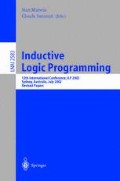Abstract
New representation languages that integrate first order logic with Bayesian networks have been proposed in the literature. Probabilistic Relational models (PRM) and Bayesian Logic Programs (BLP) are examples. Algorithms to learn both the qualitative and the quantitative components of these languages have been developed. Recently, we have developed an algorithm to revise a BLP. In this paper, we discuss the relationship among these approaches, extend our revision algorithm to return the highest probabilistic scoring BLP and argue that for a classi- fication task our approach, which uses techniques of theory revision and so searches a smaller hypotheses space, can be a more adequate choice.
Access this chapter
Tax calculation will be finalised at checkout
Purchases are for personal use only
Preview
Unable to display preview. Download preview PDF.
References
J. Binder, D. Koller, S. Russell and others. Adaptive probabilistic networks with hidden variables. Machine Learining. pp.213–244, 1997.
C.A. Brunk, 1996. An Investigation of knowledge Intensive Approaches to Concept Leaning and Theory Refinement. Ph.D. thesis, University of California, Irvine, CA.
D.M. Chickering. Learnig Bayesian networks is NP-complete. In: Learning from Data: Artifial Intelligence and Statiscs V. D. Fisher and H.-J. Lenz. Spring Verlag, pp.121–130, 1996.
N. Friedman, I. Nachman and D. Peér. Learning Bayesian Network Structure from Massive Datasets: The Sparse Candidate Algorithm. In Proceedings of the Fifteenth Conference on Uncertainty in Articial Intelligence. pp.206–215, 1999.
I. Fabian and D. A. Lambert. First-Order Bayesian Reasoning. Proceedings Eleventh Australian Joint Conference on Artificial Intelligence. 1502, 131–142, 1998.
N. Friedman, L. Getoor, D. Koller and A. Pfeffer. Learning Probabilistic Relational Models. Proc. IJCAI-99, 1300–1309, 1999.
P. Haddawy. An overview of some recent developments on Bayesian problem soving techniques. AI Magazine, Spring 1999-Special issue on Uncertainty in AI, 1999.
D. Heckerman. A tutorial on learning with Bayesian networks. In M.I. Jordan, editor, Learning in Graphical Models, pp 301–354. MIT Press Cambridge, MA, 1998.
M. Jaeger. Relational Bayesian Networks. Proc. 13th Conference on Uncertainty in AI. pp.266–273. Morgan Kaufmann, 1997.
K. Kersting, L. De Raedt and S. Kramer. Interpreting Bayesian Logic Programs. In Working Notes of the AAAI-2000 Workshop on Learning Statistical Models from Relational Data (SRL), Austin, Texas, 2000.
K. Kersting and L. De Raedt. Bayesian Logic Programs. Proc. of the Work-in-Progress Track at the 10th International Conference on Inductive Logic Programming, 2000.
K. Kersting and L. De Raedt. Bayesian Logic Programs. Technical Report 151, University of Freiburg, Institute for COmputer Science, Abril 2001.
K. Kersting and L. De Raedt. Towards Combining Inductive Logic Programming with Bayesian Networks. In proceedings of the Eleventh International Conference of Inductive Logic Programming. Strasbourg, France, pp. 118–131, 2001.
K. Kersting and L. De Raedt. Adaptive Bayesian Logic Programs. In proceedings of the Eleventh International Conference of Inductive Logic Programming. Strasbourg, France, pp. 104–117, 2001.
D. Koller. Probabilistic Relational Models. In Proc. of the 9th Int. Workshop on ILP. LNAI 1634, 3–13, Springer Verlag, 1999.
D. Koller and A. Pfeffer. Learning probabilities for noisy first-order rules. In Proc. of the 15th International Joint Conference on Artficial Intelligence (IJCAI-97), 1316–1323, 1997.
W. Lam and F. Bacchus. Learning Bayesian belief networks: An approach based on the mdl principle. Computatinal Intelligence, 10(3),pp. 269–29, 1994.
S.L Lauritzen. The Em algorithm for graphical association models with missing data. Computational Statistics and Data Analysis, 19: 191–201, 1995.
J. Lloyd. Foundations of Logic Programming. Springer Verlag, 2. edition, 1989.
S. Muggleton. Stochastic logic programs. In L.De Raedt, editor, Advances in Inductive Logic Programming. IOS Press, 1996.
G.J. McLachlan and T. Krishnan. The EM algorithm and Extensions. Wiley Interscience, 1997.
T. Mitchell. Machine Learning. McGraw-Hill New York, NY, 1997.
L. Ngo and P. Haddawy. Answering queries from context-sensitive probabilistic knowledge bases. Theoretical Computer Science, 171:147–177, 1997.
J. Pearl. Reasoning in Intelligent Systems: Networks of Plausible Inference. Morgan Kaufman, 2. edition, 1991.
D. Poole. Probabilistic horn abduction and bayesian networks. Artificial Intelligence, 64(1): 81–129, 1993.
D. Poole. Abducing Through Negation as Failure: Stable models within the independent choice logic. Journal of Logic Programming, 44: 5–359, 2000.
D. Poole. Learning, Bayesian Probability, Graphical Models, and Abduction. P. Flach and A. Kakas, editors, Abduction and Induction: essays on their relation and integration. Kluwer, 1998.
S. Ramachandran and R. Mooney. Theory Refnement of Bayesian Networds with Hidden Variables. 15th International Conference on Machine Learning (ICML), pp.454–462, Morgan Kaufman, 1998.
K. Revoredo and G. Zaverucha. Theory Refinement of Bayesian Logic Programs. Proceedings of the Eigth International Conference on Neural Information Processing (ICONIP), Shanghai, China. pp. 1088–1092, 2001.
B. Richards and R. Mooney. Automated Refinement of First-Order Horn-Clause Domain Theories. Machine Learning 19, pp. 95–131, 1995.
S. Wrobel. First-order Theory Refinement. Advances in Inductive Logic Programming, edited by Luc de Raedt, pp. 14–33, IOS Press, 1996.
Author information
Authors and Affiliations
Editor information
Editors and Affiliations
Rights and permissions
Copyright information
© 2003 Springer-Verlag Berlin Heidelberg
About this paper
Cite this paper
Revoredo, K., Zaverucha, G. (2003). Revision of First-Order Bayesian Classifiers. In: Matwin, S., Sammut, C. (eds) Inductive Logic Programming. ILP 2002. Lecture Notes in Computer Science(), vol 2583. Springer, Berlin, Heidelberg. https://doi.org/10.1007/3-540-36468-4_15
Download citation
DOI: https://doi.org/10.1007/3-540-36468-4_15
Published:
Publisher Name: Springer, Berlin, Heidelberg
Print ISBN: 978-3-540-00567-4
Online ISBN: 978-3-540-36468-9
eBook Packages: Springer Book Archive

